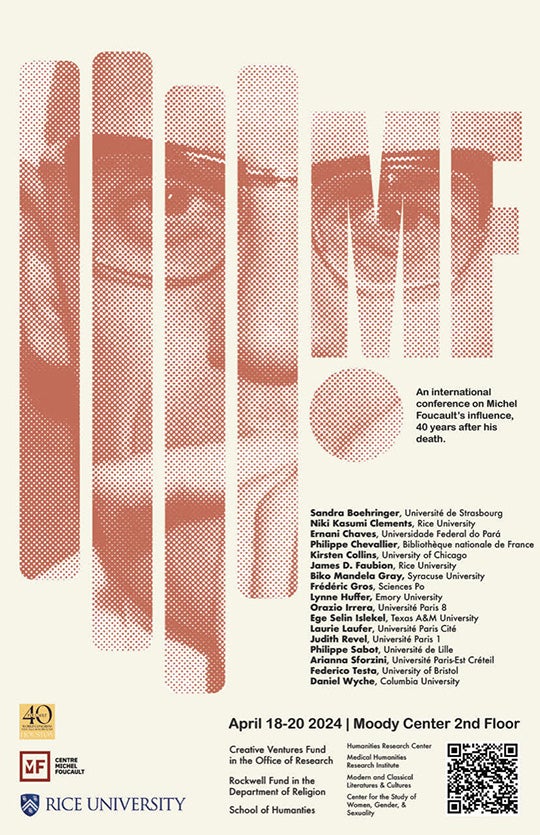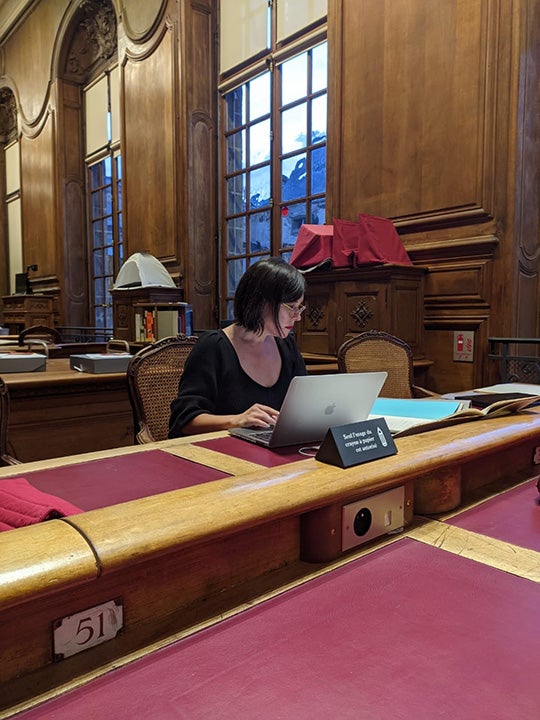
Rice University will convene a group of international scholars as part Foucault: 40 Years After, a world congress commemorating the enduring legacy of Michel Foucault. With more than 70 events worldwide, this congress underscores Foucault's global impact on ethics, biopolitics, poverty, racism and sexual exclusion. The April 18-19 Rice event, Foucault: Genealogies for the Future, is being spearheaded by Niki Kasumi Clements, Rice's Watt and Lilly Jackson Associate Professor of Biblical Studies and a prominent figure in Foucault scholarship.
"We need to have an international conversation in order to be able to think more expansively about this influence, both in terms of its limitations and also in terms of its current possibilities," Clements said. "Making Rice an epicenter for the conversation in the United States right now is part of the goal here, bringing the French experts to bear here so that we can all learn from them and invite students and community members to engage directly with this cutting-edge research."
The conference is the second Foucault-focused event Clements has organized. The first, initially slated for April 2020 and centered on Foucault's posthumous publication of "Confessions of the Flesh: The History of Sexuality, Volume 4," was delayed by the COVID-19 pandemic and reimagined as a virtual conference in 2021 co-hosted by Rice Emeritus Professor James D. Faubion and featuring scholars including Peter Brown, James Bernauer and Elizabeth Clark.
Foucault remains a towering figure in academia and culture despite his death in 1984. His multifaceted contributions span philosophy, activism and political advising. Foucault's prominence surged in the United States and globally in the 1970s, launching him as a pivotal figure in France and a beacon for social movements and academic discourses, particularly in LGBTQ+ rights and gender studies.
"He was a huge activist," Clements said. "He was constantly engaging in fights for rights on the ground. He was going to Poland in solidarity with Lech Wałęsa and fighting the execution of Basque members in Spain, exposing prison violence and abuse from France to Attica in New York."

In 1981, Time magazine profiled Foucault, labeling him the "philosopher of power."
"He is really at the heart of so many of these social movements and political possibilities from the '80s and '90s," Clements said. "He's also part of this wave in academics where everything becomes overly saturated by what we call French theory."
In France, the reception of Foucault has been different, much more quiet, according to Clements. She expressed appreciation for featured speakers who have long worked in the archives, including Philippe Chevallier, Frédéric Gros, Orazio Irrera, Philippe Sabot and Arianna Sforzini, who have meticulously explored Foucault's archives preserved at the Bibliothèque nationale de France and under the care of archivist Laurence Le Bras. Other central figures include Foucault's nephew Henri-Paul Fruchaud and Daniele Lorenzini, who have been publishing prolifically from the archives. Their insights not only illuminate Foucault's historical contributions but also inform contemporary discourse.
"I'm so indebted to these scholars first through their written work and then in terms of the kind of community that they've let me be a part of," Clements said.
The conference is supported by Rice's Creative Ventures Fund in the Office of Research, the Rockwell Fund in the Department of Religion and the School of Humanities. It is co-sponsored by the Center for the Study of Women, Gender and Sexuality, the Humanities Research Center, the Medical Humanities Research Institute and the Department of Modern and Classical Literatures and Cultures. The lectures will be open to the public and livestreamed for a global audience.
"I've been working in Foucault's archives at the Bibliothèque nationale de France since 2019, which gives us an entirely new terrain for understanding his last decade and its contemporary relevance," Clements said.
Clements is currently writing two books "Foucault's Histories of Sexuality" and "Foucault the Confessor" that explore his engagement with Christian texts and their influence on his ethical inquiries between 1974-84.
"It introduces people to three different movements in his own thought, how he changes his own archives to antiquity and how he changes his conceptual apparatus from power and knowledge to also thinking about ethics and critique," Clements said.
Clements said she hopes that academics, artists and activists will attend the conference, highlighting Foucault's relevance in discussions of queer rights, sexuality, prison abolition and challenging what counts as normal.
"These are the kinds of questions that are oftentimes very segregated from how the study of religion is perceived for a lot of reasons that have to do with conservatism in the United States," she said. "So from a disciplinary perspective, I hope that this conference can help to dissolve that by showing how radically transformative these historical and philosophical inquiries can be - in this case, for a radical French theorist who spent the last decade of his life trying to diagnose our present and how we can change the world."
To register for the conference, click here.






